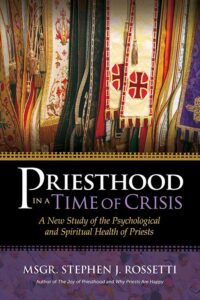
Tim Walch reviews “Priesthood in a Time of Crisis” by Msgr. Stephen Rossetti.
By Tim Walch
Book Review
“Priesthood in a Time of Crisis: A New Study of the Psychological and Spiritual Health of Priests.” By Msgr. Stephen J. Rossetti. Ave Maria Press, 2023. 173 pp. $18.95.
“How are you, Father?” That question passes for small talk after Sunday Mass. “I’m doing just fine,” is a common response from priests and pastors alike. It’s a simple exchange with an important meaning. Despite the challenges of the pandemic and the sexual abuse crisis, most American priests say that they are happy and enjoy their work.
That bit of good news comes from a new study by Msgr. Stephen J. Rossetti, a research professor of pastoral studies at the Catholic University of America. Msgr. Rosetti has been evaluating the psychological and spiritual health of American priests for more than three decades.
His most recent book, “Priesthood in a Time of Crisis,” is the culmination of three major surveys of the priesthood in 2004, 2009 and 2021. In all, Msgr. Rosetti contacted thousands of priests in dozens of dioceses across the country. He used modern psychological tests to compare the mental health of priests to that of the general population. These techniques allowed him to focus closely on the factors that made for a happy and healthy clergy.
The results led to several notable and heartening conclusions. First, the study revealed that priestly happiness has been increasing at a steady pace over the last several decades, even in the face of the challenges of parish life. Over 90% of priests in the 2021 survey, for example, agreed with the statement: “Overall, I am happy as a priest.”
Another important discovery was the growing number of priests who embrace a rich spiritual life. Given the hectic nature of pastoral duties, it’s gratifying that most priests spend at least 30 minutes a day in private prayer.
Not surprisingly, celibacy remains an issue of discussion among priests. Msgr. Rossetti discovered that support for celibacy among priests remains high. In fact, the percentage of priests supporting celibacy increased from 75% in 2009 to 82% in 2021.
The job is not without its special challenges, of course. The persistent reports of sexual abuse that is said to have occurred decades ago and the ravages of the COVID-19 pandemic on Church life are prominent in the survey data. It has not been easy, but the data indicates that mental wellness among priests remains very positive.
The data also indicates significant distress among young priests in the first decade after their ordination. The crucial indicators that affect these priests’ psychological and spiritual health are loneliness, low self-esteem and lack of priestly fraternity, childhood trauma, sexual conflict, and intimacy with God, among other issues.
There is some irony in all the positive data. Even as the mental and spiritual health of priests remains robust, data from other sources indicates that lay Catholics are struggling with their own religious faith. Remaining committed to the Church has been difficult for many young Catholic families.
The response to this study has been heartening. “Both hopeful and challenging,” writes Father Carter Griffin, the rector of St. Paul Seminary in Washington, D.C. He says “this book is enormously helpful and encouraging for priests and for all those involved in priestly formation and indeed for all Catholics who love their priests and wish to support them with their prayers, assistance, and affection.”
“Priesthood in a Time of Crisis” is a cautionary tale. As Msgr. Rossetti notes in the first sentence of this book, “it has been a rough couple of decades for the Catholic faithful in general and, in particular, for American priests.” Now more than ever, we should be grateful for these special men and their commitment to the People of God.
(Timothy Walch is a lay director at St. Thomas More Parish in Coralville and a member of The Catholic Messenger Board of Directors. He regularly reviews books for the Messenger and other publications and is the author of many books including “Irish Iowa” (2019).)











